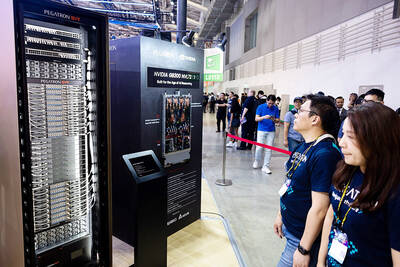MediaTek Inc (聯發科) has hired a former US Department of Commerce official to help it navigate worsening US-China tensions that have already ensnared its customer Huawei Technologies Co (華為).
Patrick Wilson, who most recently served as director of the department’s Office of Business Liaison, has been appointed vice president of government affairs at MediaTek USA to lead its public policy initiatives, the chip designer said in a draft press statement seen by Bloomberg News.
Wilson previously worked at the Semiconductor Industry Association, where he led the trade group’s dealings with the US federal government.
Technology companies with ties to or operations in China have come under increasing scrutiny from Washington amid growing tensions with Beijing, forcing them to ramp up spending on lobbying efforts in the US.
The department said in May that it would require licenses before allowing US technology to be used by Huawei or its 114 subsidiaries, including its chip-design unit HiSilicon Technologies Co (海思半導體), thus preventing suppliers, including Taiwan Semiconductor Manufacturing Co (TSMC, 台積電) from shipping HiSilicon-designed parts to the Chinese company.
Earlier this year, TSMC hired former Intel Corp lobbyist Peter Cleveland, while ByteDance Ltd (字節跳動), the Chinese owner of the TikTok app that has also come under US scrutiny, spent a record US$500,000 on federal lobbying in the quarter ended June 30.
Analysts are expecting Huawei to rely on MediaTek for chip design after TSMC said it would not ship new chips designed by HiSilicon after Sept. 15.
MediaTek might supply its chips to Huawei for a flagship handset that is expected to be introduced this year as US export controls affect supply from Qualcomm Inc and TSMC, Sanford C. Bernstein analysts, including Mark Li, wrote in a note on Thursday last week.
MediaTek shares closed up 0.29 percent at NT$682 yesterday in Taipei trading. The stock has gained 148.9 percent since its March low of NT$274, Taiwan Stock exchange data showed.
Additional reporting by staff writer

AI TALENT: No financial details were released about the deal, in which top Groq executives, including its CEO, would join Nvidia to help advance the technology Nvidia Corp has agreed to a licensing deal with artificial intelligence (AI) start-up Groq, furthering its investments in companies connected to the AI boom and gaining the right to add a new type of technology to its products. The world’s largest publicly traded company has paid for the right to use Groq’s technology and is to integrate its chip design into future products. Some of the start-up’s executives are leaving to join Nvidia to help with that effort, the companies said. Groq would continue as an independent company with a new chief executive, it said on Wednesday in a post on its Web

RESPONSE: The Japanese Ministry of Finance might have to intervene in the currency markets should the yen keep weakening toward the 160 level against the US dollar Japan’s chief currency official yesterday sent a warning on recent foreign exchange moves, after the yen weakened against the US dollar following Friday last week’s Bank of Japan (BOJ) decision. “We’re seeing one-directional, sudden moves especially after last week’s monetary policy meeting, so I’m deeply concerned,” Japanese Vice Finance Minister for International Affairs Atsushi Mimura told reporters. “We’d like to take appropriate responses against excessive moves.” The central bank on Friday raised its benchmark interest rate to the highest in 30 years, but Bank of Japan Governor Kazuo Ueda chose to keep his options open rather than bolster the yen,

Even as the US is embarked on a bitter rivalry with China over the deployment of artificial intelligence (AI), Chinese technology is quietly making inroads into the US market. Despite considerable geopolitical tensions, Chinese open-source AI models are winning over a growing number of programmers and companies in the US. These are different from the closed generative AI models that have become household names — ChatGPT-maker OpenAI or Google’s Gemini — whose inner workings are fiercely protected. In contrast, “open” models offered by many Chinese rivals, from Alibaba (阿里巴巴) to DeepSeek (深度求索), allow programmers to customize parts of the software to suit their

Global server shipments are expected to surge to 15 million units next year, from 4 million units this year, with artificial intelligence (AI) servers accounting for about 30 percent, driven by massive capital spending by major cloud service providers, the Market Intelligence and Consulting Institute (MIC) said on Thursday last week. Major cloud service providers — including Google’s parent company Alphabet Inc, Microsoft Corp, Amazon.com Inc and Meta Platforms Inc — are projected to budget US$450 million for capital expenditure next year, up from US$400 million this year, MIC ICT [information and communications technology] Industry Research Center director Edward Lin